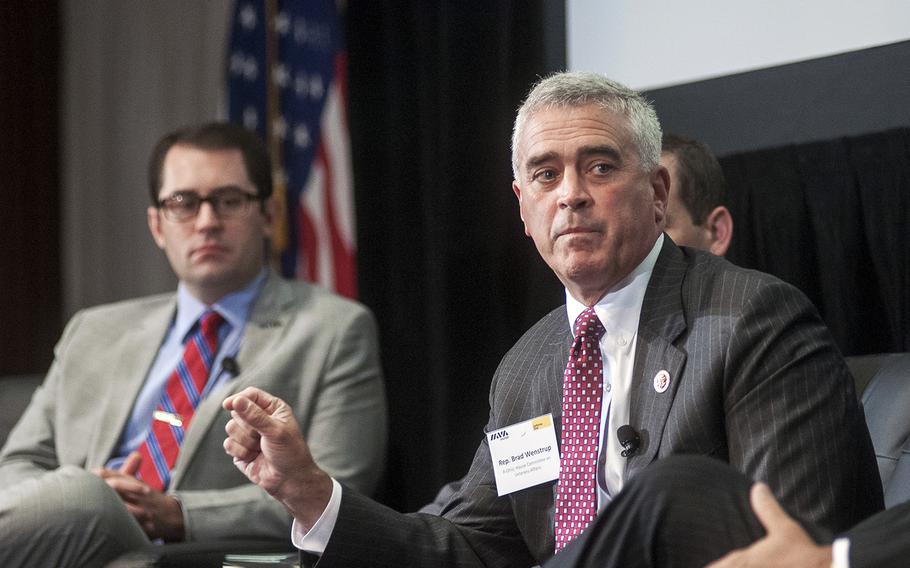
U.S. Rep. Brad Wenstrup, R-Ohio, speaks during a panel discussion on veterans issues at the National Press Club in Washington on July 30, 2014. Wenstrup on Wednesday, March 29, 2017, introduced House Resolution 1662, which would immediately ban smoking inside VA facilities and require the VA to close outdoor designated smoking areas by October 2022. (Carlos Bongioanni/Stars and Stripes)
WASHINGTON — The Department of Veterans Affairs has attempted for years to rally congressional support against a 25-year-old mandate that there must be smoking areas at its health care facilities. At a Wednesday hearing, a bill finally introduced to repeal that law was discussed publicly for the first time.
“VA strongly supports this,” VA Deputy Undersecretary for Health Jennifer Lee told a House subcommittee. “We have proposed legislation for many years to reverse the requirement. We believe veteran patients have a right to be protected from secondhand smoke exposure when seeking health care.”
Rep. Brad Wenstrup, R-Ohio –- a physician, veteran and member of the House Committee on Veterans’ Affairs -– introduced House Resolution 1662, which would immediately ban smoking inside VA facilities and require the VA to close outdoor designated smoking areas by October 2022.
Citing VA estimates, Wenstrup said the department would save about $1.2 million each year spent on maintaining the areas, some of which are climate-controlled.
While the VA argued the smoking areas were a health concern to patients and employees, the American Legion, Paralyzed Veterans of America, Disabled American Veterans and Veterans of Foreign Wars took no firm stance on the bill.
Instead, the groups warned of unintended consequences, such as forcing a lifestyle change and eliminating a form of stress relief and social interaction for veteran patients. In prepared testimony, the American Legion said the measure could be government overreach –- a way to “legislate personal choices.”
The VFW said in its testimony that veterans might not seek treatment at VA facilities if they couldn’t smoke there.
Retired Col. James Currie said he wouldn’t be surprised by backlash from veterans’ organizations. Currie directs a group of veterans in the U.S. Public Health Service that in part aims to reduce smoking in the military, and he wrote a letter to Wenstrup in support of the bill.
“I’m sure there are going to be some groups that object to it, believing this is a freedom-of-choice issue,” Currie said. “We think of this as something we owe our veterans, instead of something we’re taking away.”
There are nearly 1,000 outdoor smoking areas at VA facilities nationwide, as well as 15 indoor smoking areas. In addition to secondhand smoke affecting others, Currie said he thought smoking areas were enabling veteran smokers to maintain the habit.
About 20 percent of veterans enrolled in VA health care are smokers, Lee said.
“I’m very sympathetic. My father was a World War II B-17 bomber pilot. … He was a heavy smoker all of his life, and it killed him at the age of 56. Our point is, we know it’s really hard. We don’t underestimate that, but we think VA should do everything possible to help veterans help themselves by stopping the use of tobacco.”
The law requiring VA to establish smoking areas was enacted in 1992, and, while smoking areas at other federal facilities were closed in 2009, that law required VA to maintain them.
A study published in the American Journal of Public Health in 2013 contends the tobacco industry manipulated veterans organizations and Congress to create that law, the Veterans Health Care Act of 1992, after the first VA secretary, Ed Derwinski, announced in 1990 his intentions to prohibit smoking inside VA facilities.
“The industry’s legislative success in 1992 continues to undermine [smoking] cessation messages among veterans, and public health advocates must now fight battles that should have been won long ago,” the study reads.
In their comments, Lee and Wenstup noted that prohibiting smoking has long been the standard at many private health care facilities, including large systems like the Mayo Clinic and Kaiser. They also made known that the VA offers services to help veterans stop smoking.
“As a doctor and a veteran, I feel strongly we cannot allow a practice as toxic and dangerous as smoking to continue taking place on VA medical facility campuses, where our most vulnerable patients are trying to heal and our hardest working employees are trying to work,” Wenstrup said. “This will ensure VA is in line with industry standards.”
wentling.nikki@stripes.com Twitter: @nikkiwentling